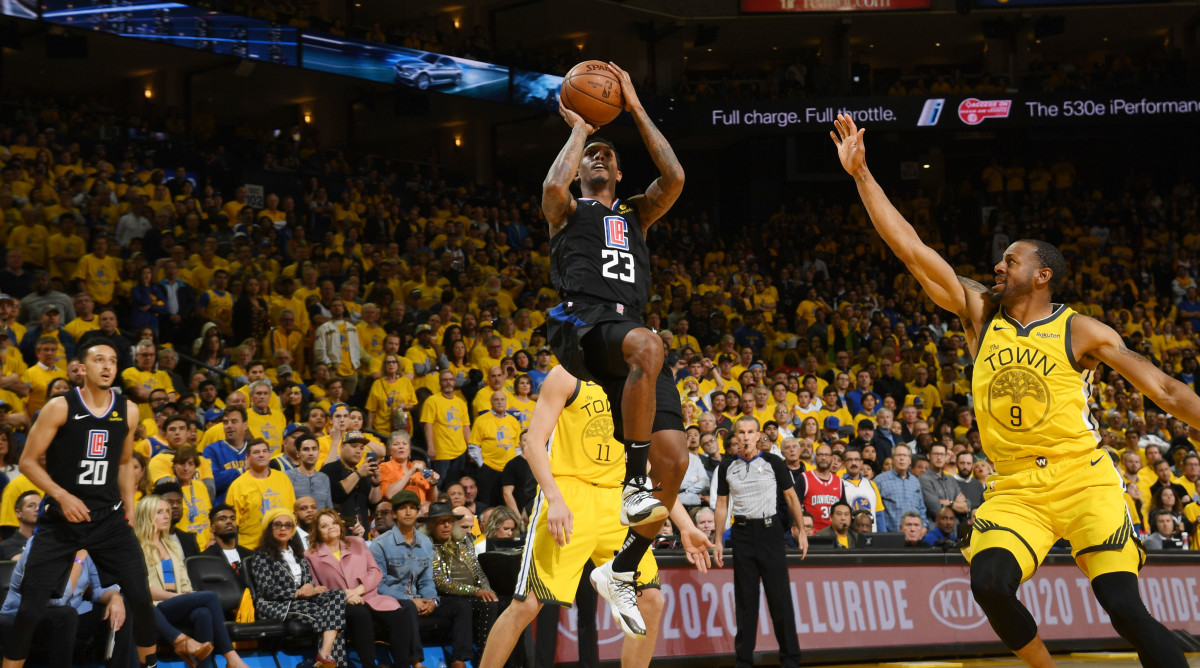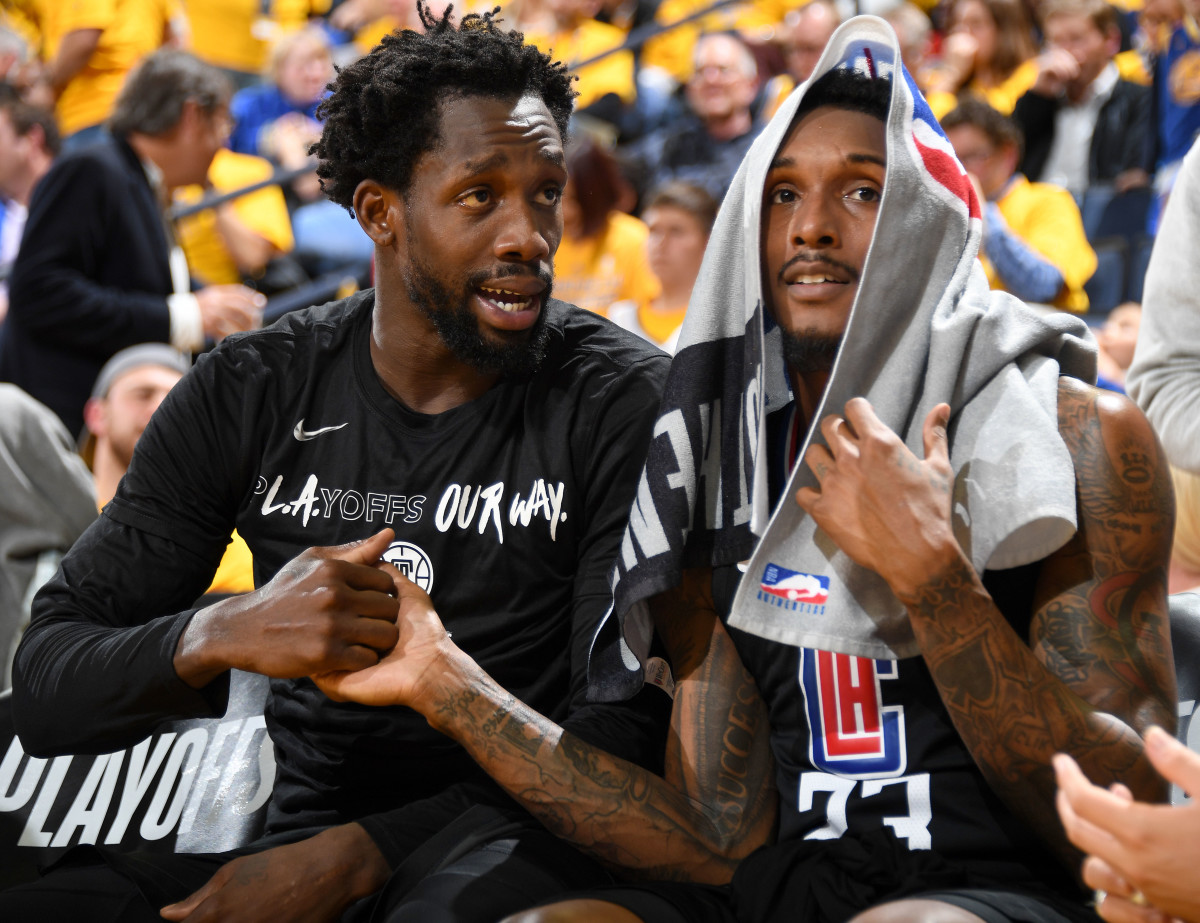With Historic Comeback, the Clippers Make Oracle Arena Their Own

OAKLAND, Calif.—There is no bleaker room in sports than the visitor’s lockers at Oracle Arena. If those walls could talk, they would tell you that over these past five years, they’ve grown tired of dejection. How they could do without all the bickering. They would recount the halftime speeches so empty that even their orators couldn’t believe them, and the deaf ears they fell on midway through another double-digit loss. Two hundred and fifty-one games have been played at Oracle since the rise of the championship Warriors. Only 38 visitors have actually managed to win. The latest may be the most extraordinary.
After trailing by 31 points in the third quarter, the Clippers plugged away until they were within 10, then within five, and then somehow tied with a little more than a minute remaining. Perhaps even more impressive: Los Angeles outdueled the defending champions the rest of the way, coming up with every play necessary until the deed was done, 135–131. Lou Williams hit a series of increasingly preposterous shots. In a high-stakes scramble, one rookie (Shai Gilgeous-Alexander) set up another (Landry Shamet) for a go-ahead three-pointer. Montrezl Harrell, a 64% free throw shooter, iced the game at the line with just five seconds remaining. A stunned Warriors team shuffled off to interrogate their failings behind closed doors. The Clippers proceeded to make the visitors’ locker room their own, allowing themselves some tempered celebration after pulling off the biggest comeback in NBA playoff history.
“I’m going to try to be as humble as possible right now,” said Clippers guard Patrick Beverley. It was Beverley who instigated many of Kevin Durant’s nine turnovers while restricting the reigning Finals MVP to just eight shots. It’s easy to say that Durant should have done more, though one can’t overlook the nuisance glued to his hip with an arm wrapped around his waist. Durant spent much of his night with his hands up in an attempt to convince officials of his innocence, making it almost impossible to establish plausible scoring position. At just 6'1", Beverley mucked up his matchup with Durant beyond recognition. It became something beyond basketball: an exercise in walking the line of permissible contact, or just blurring it to the point that it becomes unclear where the rules even apply. Neither was able to finish the game because both had fouled out. Beverley had won.

Afterward, the Clippers’ rabble-rousing point guard stared through the floor with a simmering intensity—part of the long comedown from a frenzied competitive high. A few lockers over, Harrell had turned up his speaker and burst into song. “Baby, I’m the clean-up man,” he crooned, in the words of the poet Boosie BadAzz. Harrell had outdone himself. After kicking off the postseason with the best playoff performance of his young career, Harrell followed up with a 26-point, 10-rebound effort in Game 2, in which he was perfect from the field on nine attempts. Whatever the Clippers threw his way was as good as dunked. The angles he finds to the rim should be impossible. Somehow, Harrell finds the opportunity in them—dodging opponents as he goes before hurling himself toward the basket. There is no countdown to launch. Harrell is already down the lane and in the air before most defenses are in a position to respond, particularly when that defense is playing with all the urgency of an afternoon nap.
Odd as it sounds, the Clippers may be the opponent you’d least want to build a 31-point lead against. Grinders like Harrell and Beverly won’t stop, and probably couldn’t if they tried. It is plainly antithetical to who they are as players and how they experience the game. Williams is exactly the kind of scorer that can sneak in 10 or 12 points before setting off any alarms. This had become a way of life for the Clippers; players felt a wave of deja vu from their 28-point comeback against Boston, though to be fair, they could have tapped into a 25-point comeback to top Detroit or a 20-point correction against Charlotte just the same.
“You just love this group,” Clippers coach Doc Rivers said. “They just don’t give in.”
The Clippers won’t be able to stop the Warriors for a full 48 minutes, but a comeback bid has a way of putting the favorite into a defensive position. By the time Golden State had started to take the threat seriously, they were already cold and out of sync. The endeavor began, as any does against the defending champs, with opportunism. The Warriors would commit 14 turnovers during the Clippers’ game-turning run (Durant alone was responsible for five), not to mention the other possessions stalled out by their near-blunders. The most talented team in basketball shot 29.6% from the field during that stretch, all while watching Williams lean for bucket after bucket. “The wheels fell off,” Stephen Curry said. Rather than fasten them back on, the Warriors attempted to drag their axles over the finish line.
“We got exactly what we deserved,” Warriors coach Steve Kerr said. Over the game's final 19 minutes, Golden State was outscored, 70–37.

It was Williams who saw that justice done. To hear him describe it, the deciding run of Game 2 sounds like an out-of-body experience. A flow state. A commune with some higher basketball power. “I’m one of those guys that can get hot,” Williams said. “I just got lost in the moment.” Williams (36 points, 11 assists) was a vessel for reverses, runners, and step-backs of all kinds. Klay Thompson and Andre Iguodala were present, but immaterial. Kevon Looney and Andrew Bogut succeeded only in prompting Williams to change up his timing or attempt different sorts of moves.”You willed it,” Harrell told him from the podium. In a desperate moment, the Death Lineup Warriors even attempted to trap Williams outright, triggering the pass to Gilgeous-Alexander that ended in Shamet’s open three and their Game 2 demise.
Following the game, the Clippers made plates from the postgame buffet in their locker room: some with salads or pasta, some with In-N-Out burgers and fries to celebrate history, animal style. The room buzzed. Teammates laughed and lingered. The series, at the very least, would return to Oracle. And in the back, Charlie Widdoes of Clippers digital found Williams lounging on a training table with a plate of nachos, making himself at home.
